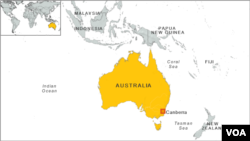SYDNEY —
Vigils have been held across Australia to demand the release of more than 50 refugees who have been classified as a threat to national security. The detainees have all been granted asylum but are being held on the orders of Australia’s intelligence services.
“Free Ranjini, free the refugees! Free Ranjini, free the refugees!” protesters shouted.
From Perth to Brisbane, and from Sydney to Melbourne, hundreds rallied in support of 56 refugees who are considered to be a security risk. Most were Tamils from Sri Lanka, while others have fled Iran, Burma and Afghanistan.
Friday marks one year since one of the refugees, a pregnant Sri Lankan called Ranjini, was detained along with her two young sons in Melbourne by immigration authorities.
Campaigners said the mother-of-three has suffered psychological stress as she attempts to cope with a baby born in detention as well as two increasingly unsettled older children.
Australia’s national security service, ASIO, does not have to tell the refugees why they are seen as a potential threat.
Ian Rintoul from the Refugee Action Coalition says some detainees did have dealings with the Tamil Tigers, or LTTE - a group designated as a foreign terrorist organization by the United States. But he says they pose no danger to Australia.
“My discussions with those people, on the evidence I have seen from ASIO, yes, I am 100 percent sure that these people are not any kind of threat in the way that people normally think," Rintoul said. "We are not talking about bombs in supermarkets. The LTTE is not a proscribed organization; it has got no history of violent activity outside of Sri Lanka. It is very difficult to see, you know, what kind of information that ASIO would have, which would indicate otherwise, and in any case I have said over and over again, if the government has got that information let us see it publicly.”
Although they have been granted asylum, most of the refugees have been incarcerated in Australia for between three and four years. Officials will not say why they were granted protection only then to be branded a threat to national security.
Adverse security assessments cannot be challenged, but after pressure from campaigners the government has allowed the refugees’ cases to be reviewed by former federal court judge, who can make recommendations but has no power to free the detainees.
The government in Canberra has insisted that any refugee deemed to be a security risk would not be released from custody.
Advocates insist that such intransigence has prompted suicide attempts, hunger strikes and other forms of self-harm by the detainees, who could face months or even years in detention.
“Free Ranjini, free the refugees! Free Ranjini, free the refugees!” protesters shouted.
From Perth to Brisbane, and from Sydney to Melbourne, hundreds rallied in support of 56 refugees who are considered to be a security risk. Most were Tamils from Sri Lanka, while others have fled Iran, Burma and Afghanistan.
Friday marks one year since one of the refugees, a pregnant Sri Lankan called Ranjini, was detained along with her two young sons in Melbourne by immigration authorities.
Campaigners said the mother-of-three has suffered psychological stress as she attempts to cope with a baby born in detention as well as two increasingly unsettled older children.
Australia’s national security service, ASIO, does not have to tell the refugees why they are seen as a potential threat.
Ian Rintoul from the Refugee Action Coalition says some detainees did have dealings with the Tamil Tigers, or LTTE - a group designated as a foreign terrorist organization by the United States. But he says they pose no danger to Australia.
“My discussions with those people, on the evidence I have seen from ASIO, yes, I am 100 percent sure that these people are not any kind of threat in the way that people normally think," Rintoul said. "We are not talking about bombs in supermarkets. The LTTE is not a proscribed organization; it has got no history of violent activity outside of Sri Lanka. It is very difficult to see, you know, what kind of information that ASIO would have, which would indicate otherwise, and in any case I have said over and over again, if the government has got that information let us see it publicly.”
Although they have been granted asylum, most of the refugees have been incarcerated in Australia for between three and four years. Officials will not say why they were granted protection only then to be branded a threat to national security.
Adverse security assessments cannot be challenged, but after pressure from campaigners the government has allowed the refugees’ cases to be reviewed by former federal court judge, who can make recommendations but has no power to free the detainees.
The government in Canberra has insisted that any refugee deemed to be a security risk would not be released from custody.
Advocates insist that such intransigence has prompted suicide attempts, hunger strikes and other forms of self-harm by the detainees, who could face months or even years in detention.










